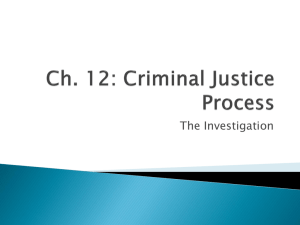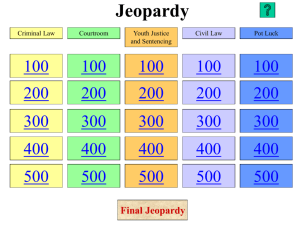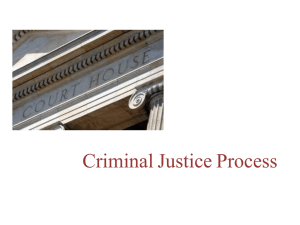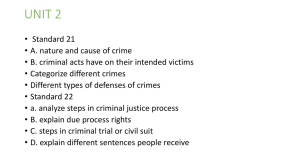First Appearance Preliminary Hearing Information or Indictment
advertisement
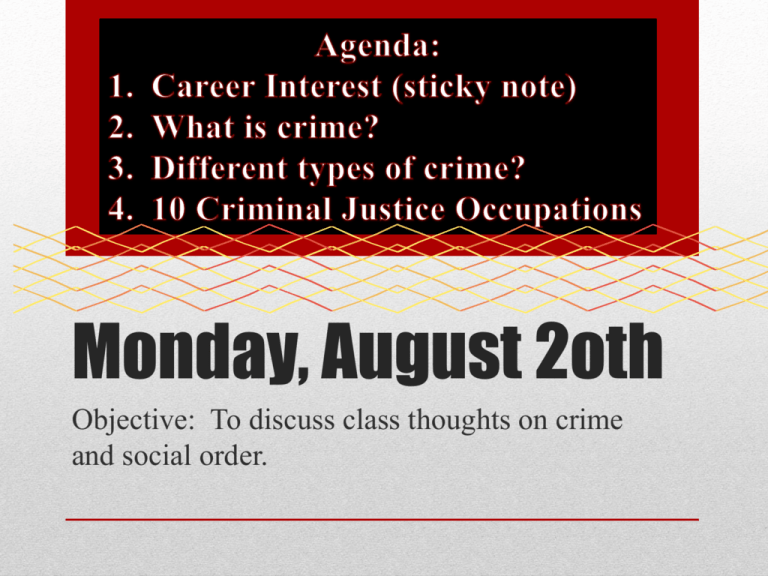
Monday, August 2oth Objective: To discuss class thoughts on crime and social order. nd Wednesday, August 22 Objective: To have a better understanding of the history of crime in our country as well as the balance of individual rights and public order. Wednesday, August 22nd Objective: To have a better understanding of the history of crime in our nation. American History of Crime • • • • • • • • 1850 – 1880 Early 20th century 1945 – 1960 1960 – 1970 1970 – 1980 Mid 80’s Early 90’s Mid 90’s •Wave of organized crime -Prohibition Years •Crime rates remained relatively stable •Activities of enforcement agencies began to be scrutinized (Rodney King, Waco, TX) •“Traditional Crimes” – murder rape, and assault increased astronomically •Individual Accountability •Crime up due to social upheaval of large – scale immigration •Concern for rights of individuals = civil rights movement. Dramatic increase in reported criminal activity •Large increase in drugs and gangs • 2001 – USA Patriot ACT • Bernard MADOFF • 2011 – FBI most – wanted terrorist killed • Schmalleger Twitter • Tru TV - Justice in News Criminal Justice policy makers Book Resources • Conduct in violation of the criminal laws of a state, the federal government, or a local jurisdiction • no legally acceptable justification or excuse. USA Patriot Act of 2001 Tool that broadens investigative authority of law enforcement Applicable to many crimes other than terrorism Enacted in response to terrorist attacks on Sept. 11th, 2001 Loudly proclaim that the rights of the victimized and call for an increased emphasis on social responsibility and criminal punishment for convicted criminals Interests of society should take precedence over individual rights One who seeks to protect personal freedoms within the process of criminal justice. Carry banner of civil and criminal rights for the accused and convicted Thursday, August 23rd Objective: Have a better understanding explaining Criminal vs. Criminal Justice. “We will bring our enemies to justice: or we will bring justice to our enemies.” •Truth in action •Principle of moral rightness •Conformity to truth •Fairness •Administration of Justice •Justice is the ultimate goal here •Concerns violations of criminal law • Relationships between citizens, government agencies, and businesses in private matters What are the three components of the criminal justice system? Justice is more a product of conflicts among agencies within the system than it is the result of cooperation among Clearance component agencies. Rates – pg. 19 • Lab day to work on Process Project • Objective: Utilize class time to work on a better understanding of your step in the justice system th Friday, August 24 Investigation and Arrest •Provides legal basis for an apprehension by police Process officially recording an entry into detention after arrest and identifying the person, the place, time, reason for arrest, and arresting authority In 1963, Ernesto Miranda was accused of kidnapping and raping an 18-year-old, mildly retarded woman. He was brought in for questioning, and confessed to the crime. He was not told that he did not have to speak or that he could have a lawyer present. At trial, Miranda's lawyer tried to get the confession thrown out, but the motion was denied. In 1966, the case came in front of the Supreme Court. The Court ruled that the statements made to the police could not be used as evidence, since Miranda had not been advised of his rights. Performed during arrest and prior to questioning • You have the right to remain silent. Anything you say can and will be used against you in a court of law. You have the right to speak to an attorney, and to have an attorney present during any questioning. If you cannot afford a lawyer, one will be provided for you at government expense. Miranda v Arizona • #1 – Investigation • #2 – Arrest (limits “arrestee’s” freedom) • Serious Step • Roughly ½ of all people arrested are eventually convicted • Of those, only ¼ are sentenced to a year or more in prison • #3 – Booking • Happens during arrest process The Process - Beginning • Within hours of arrest • Brought before Magistrate (judicial officer) • Advised of charges against them • Advise of rights AGAIN • Opportunity for Bail if an option • Lawyer appointed if needed #4 - First Appearance • Establish efficient evidence • Is there probable cause to believe that… • A crime has been committed • The defendant committed the crime • Judicial Decision • Discovery function for the Defense • ? Based on prosecuting strength is there a plea bargain? #5 – Preliminary Hearing rmation • Formal written accusation • Prosecutor may seek to continue case against defendant by filing this with the court • Filed on basis of the outcome of preliminary hearing • Similar to information • Returned by a grand jury before prosecution can proceed • Alleges that a specified person has committed a specified offense, usually a felony Indictment Arraignment • First appearance of the defendant before the court that has the authority to conduct a trial • Accused stands before a judge – hears information or indictment against him or her as it is read Accused enters a plea Not guilty, Guilty, or no contest First Appearance Appears before a judge Bail & Bond Preliminary Hearing Sufficient Evidence Probable Cause Judge Information or Indictment Formal Written Accusation Grand Jury formal indicting authority Arraignment Accused stand before a judge – Enters a plea Deadlocked – jury can’t decide = judge declares mistrial Process by which a court arrives at a decision regarding a case Bench Trial = before a judge rather than jury • • • • Supervised Probation Fine Prison Term Combination of Above Sentences served at the same time Sentences served in sequence Submit to supervision by probation officer and meet other conditions set by court Offenders who have served a portion of their prison sentences may be freed on parole! 5th and 14th Amendment = Protection of individual rights pg. 24 • Found the Court embracing the 6th Amendment guarantee of a right to a lawyer for all criminal defendants and mandating that states provide lawyers for defendants who are unable to pay for them. Gideon vs. Wainwright Society that is home to a variety of different cultures that maintain unique cultural identities

